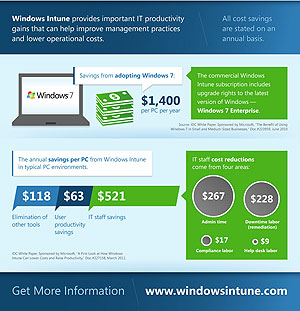REDMOND, Wash. – March 23, 2011 – When Microsoft PC management and security solutions go to the cloud, the result is Windows Intune – a new Microsoft product to help businesses manage, secure and update their fleet of PCs.

Windows Intune is a cloud-based solution that lets IT pros provide comprehensive management of PCs over a Web connection.
Windows Intune, which launches today at the Microsoft Management Summit (MMS) in Las Vegas, makes it possible for IT professionals to provide PC management and security services to their organization or client over the Internet – at a low monthly cost, said Rich Reynolds, general manager of Windows Commercial Marketing.
“If you have a PC and can connect it to the Internet, it can be managed and better protected with Windows Intune – and that’s a benefit for IT and for end users,” Reynolds said. “It’s a solution for customers of all sizes, especially those with a lightly managed or unmanaged PC environment.”
Subscriptions to Windows Intune are available now for purchase in 35 countries, or users can “try before they buy” with a free 30-day trial, he said. Paying Windows Intune customers also receive upgrade rights to Windows 7 Enterprise and future versions of Windows, ultimately giving PC users the best productivity experience with their Windows PC and helping IT lower support costs by standardizing on a single version of Windows. Subscribers also have the option of adding Microsoft Desktop Optimization Pack (MDOP) tools, which will include two new updates announced today: Microsoft BitLocker Administration and Monitoring, and Diagnostics and Recovery Toolset.
The inclusion of the Windows 7 IT features makes Intune “a very compelling package,” Reynolds said.
From a single console, the Windows Intune cloud service lets an IT manager see across all of the PCs they manage, including being able to manage updates on PCs, track what software and hardware users have installed, and provide remote assistance. It also includes endpoint protection based on Microsoft Forefront technologies.

Rich Reynolds, general manager of Windows Commercial Marketing.
Once IT employees sign up all the PCs in their environment, they can “drill down, and if needed, take action so that everybody’s up-to-date and highly secure” regardless of whether they’re connected to the corporate network or just the Internet, Reynolds said.
“You can make sure everyone has the latest updates, or see if someone’s running out of disk space, or see what hardware exists,” Reynolds said. “It’s easy to use, and it’s all in one place – an IT professional could take a look at home on a Sunday morning or at a coffee shop or anywhere that they have access to the Internet.”
Windows Intune is not just for IT professionals – it also works well for companies that provide IT solutions such as San Jose-based InfinIT Consulting, said Jerod Powell, the company’s CEO and cofounder.
Powell said InfinIT Consulting hosts cloud services and provides IT consulting, including managing the IT of “some pretty large clients” using a beta version of Windows Intune.
Powell said his company is dedicated to Microsoft solutions, and “wholeheartedly jumped in and embraced Windows Intune.” His clients have found it to be a low-cost solution that keeps them up to date and allows them to upgrade their operating system to Windows 7.
“It’s easy to sell, and it augments our existing services well knowing that when Microsoft decides to take an initiative with a product line, they go all the way with it,” Powell said.
Powell said his company worked with Microsoft during the Windows Intune beta to provide feedback. Suggestions like those from InfinIT were valuable in shaping the final product, said Joseph Dadzie, Intune’s principal group program manager.
Dadzie and his team developed Windows Intune. When it was released for beta a year ago, the team was expecting 1,000 customers to participate. They got that many in just 36 hours.

Joseph Dadzie, principal group program manager for Windows Intune.
Due to high interest, an expanded beta program opened in July, and many more customers participated – some who used Windows Intune to manage up to 3,000 PCs.
“Beta was great,” Dadzie said. “We got a lot of valuable feedback and learning both from customers and from running the service itself.”
Dadzie said one of the team’s main challenges was to make the product powerful, but also easy to use. In the future, they look forward to evolving Windows Intune to meet the changing needs of the professional environment, including more employees wanting to work remotely, and working from a wider variety of devices.
“It’s not only the employees who want to work from home – the IT folks also want to work from anywhere, so having a service that is cloud-based is a powerful way to help them manage everything but also reduce their costs,” Dadzie said.
He encouraged potential customers to try a 30-day trial version of Windows Intune.
“Microsoft is all-in when it comes to the cloud, and this is just proof of it. We’ll continue to evolve the product to meet customer needs,” Dadzie said. “We want to make IT’s job easier than it is today.”




